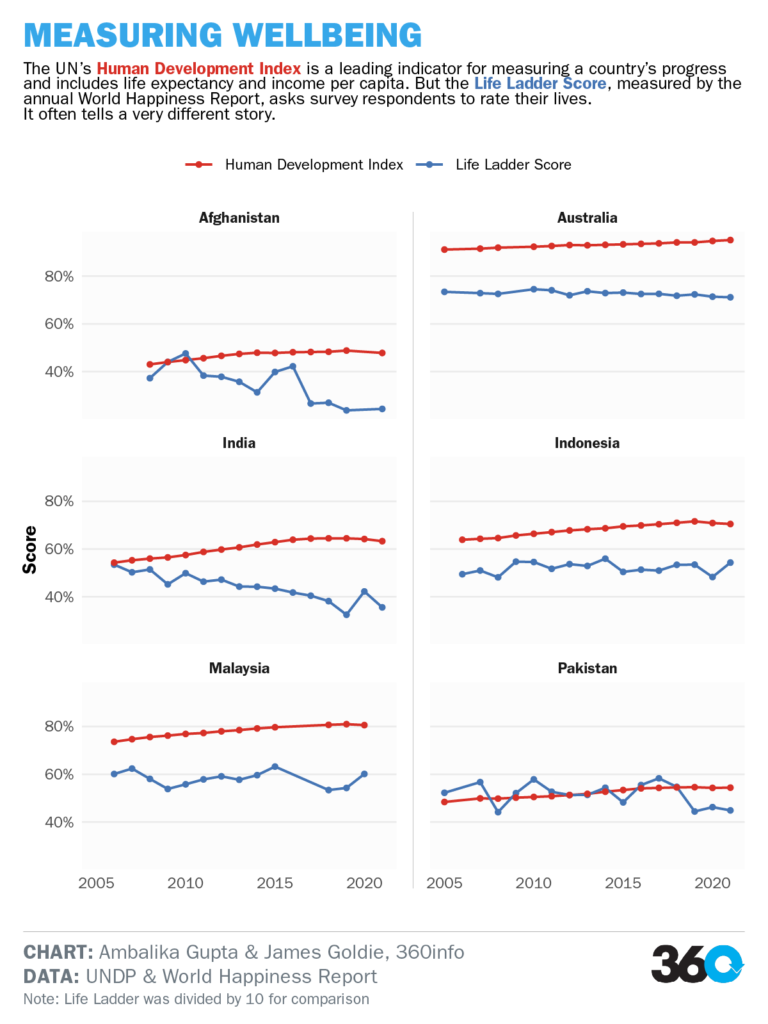Developed economies have largely tackled poverty, disease, ignorance, hygiene and idleness. It's time for a new approach.
 For nations that are already wealthy, healthy, educated, clean and employed what comes next? : ‘People exercising’ by Anupam Mahapatra is available at https://tinyurl.com/bdf2xvez Unsplash Licence
For nations that are already wealthy, healthy, educated, clean and employed what comes next? : ‘People exercising’ by Anupam Mahapatra is available at https://tinyurl.com/bdf2xvez Unsplash Licence
Developed economies have largely tackled poverty, disease, ignorance, hygiene and idleness. It’s time for a new approach.
There is a burgeoning sense among OECD policymakers that the 20th century policy paradigm — which emphasises material prosperity as an overarching goal — is played out.
A democratic revival and a new social contract are needed, perhaps to a wellbeing state; an upgrade from the welfare state. The times suit such a revival, with nations struggling with populist backlashes against technocratic rule by elites.
Unfortunately, the last forty years of (broadly desirable and effective) technocratic governance across the OECD, which have seen experts crafting large-scale policy reforms largely removed from the democratic oversight of those reforms, has left politicians ill equipped to prosecute this democratic revival.
Current policies are played out because, simply put, countries in the Global North are rich. Beveridge’s welfare state sought to tackle the ‘five great evils’ of poverty, disease, ignorance, hygiene and idleness.
Developed economies today are wealthy, healthy, educated, clean, and employed. Many people have it tough, but this is largely a matter of redistribution, not further growth.
Awareness of this material abundance is mixed with an awareness of the unsustainable nature of our lifestyles and the need for a more environmentally-friendly political economy.
To work out how to best integrate wellbeing initiatives into public policy, the question of what is wellbeing first needs to be settled.
Scientists offer various answers depending on their discipline. Psychologists emphasise mental states like happiness and purpose in life, or the nourishment of basic psychological needs for autonomy, competence and relatedness.
Development practitioners and forward-thinking economists focus on ‘capabilities’ — wellbeing means having a wider set of options from which to choose the life that is best suited to you.
And philosophers emphasise a range of primary goods including pleasure, knowledge, virtue, enfranchisement and self-actualisation.
At a high level, wellbeing is what makes a life go well. Defining wellbeing thus requires making a value judgement and this is the domain of democracy, not science.
The transition to a wellbeing state is an opportunity to establish new values around which to organise society and policy. This must begin with politics, not science.
But other than in the high-profile cases of Bhutan and New Zealand, most wellbeing public policy is presented by politicians as a dull change in public administration: tweaking outcome measures to be more cognisant of sustainability and mental health and putting a bit less emphasis on cost savings.
This technocratic focus on high-level metrics and evaluation frameworks has merit. Twentieth-century statistics cannot capture 21st-century progress. But it can also be counterproductive.
Public policy already serves a variety of goals beyond income and growth. Its ability to do so is often handicapped by the desire of central agencies, notably treasuries and finance ministries, to control policy according to a narrow set of metrics.
Broadening these from income is welcome, but not if it just means bringing in more equally narrow indicators like life expectancy, years of schooling and household energy efficiency.
Most public policy is highly contextual, especially service delivery. For example, health in a neighbourhood may be a concern of air pollution along a major road, access to evening exercise in an unsafe park and the personality of the local doctor. Life expectancy doesn’t inform you about any of these things.
Context-sensitive policy reforms and bespoke measures and evaluation frameworks are needed.
Citizens affected by policy can deliberate with practitioners who implement policy and technical experts who analyse it. This results in policy that is legitimate, implementable and rigorous.
Designing metrics for policy rather than contorting policy to fit metrics is better suited to the complexity of policymaking. Most public policy is delivered by systems — for example health, defence and social security.
These systems involve dozens of simultaneous, interlocking interventions that promote a wide variety of goals.
Systems are different from how most academics conceptualise policy and its evaluation. Academics think in terms of discrete interventions like subsidising marriage counselling.
The causal effect of these interventions can be identified experimentally using randomised-control trials (RCTs). And their effectiveness can be assessed using cost-benefit analysis (CBA).
Some policies can be implemented this way but many of them are actively harmed by insisting on RCTs and CBA as analytic frameworks.
For example, owing to a focus on employment as an outcome metric, social policies to address complex disadvantage in the UK have struggled to coordinate the range of services required to deal simultaneously with poverty, mental health, homelessness and substance use.
Hence a narrow conceptualisation of ‘evidence-based policy’ using RCTs and CBA and of wellbeing public policy aiming for ‘life expectancy’ or whatever other high-level goal can be actively counterproductive to wellbeing.
Public policy researchers have long noted that this sort of naivety about the reality of policymaking among academics impedes the translation of good science into good policy.
The wellbeing state requires democracy and political leadership first and foremost. The role of the scientist in wellbeing public policy is to enhance the quality of deliberation over policy in this political project.
Mark Fabian is assistant professor of public policy at the University of Warwick, affiliate fellow at Cambridge University’s Bennett Institute for Public Policy and adjunct fellow at the Institute for Social Change at the University of Tasmania. He declares no conflict of interest.
Originally published under Creative Commons by 360info™.












